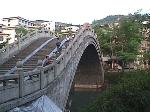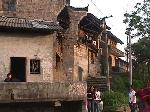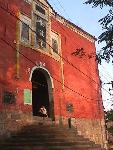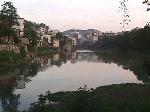- Getting around Lijiang. Dont stay in the Old Towns more than 2 days, there is nothing to do. KRISS Oct 9, 2013 05:46
- 2013 Beijing Temple Fair BENNYLAU Feb 26, 2013 03:29
- Malaysian traveling from KUL - LAX vis Shanghai PVG ZATI_DY Jan 3, 2013 20:15
Old Jishou
- Views: 3867
- |Vote: 0 0
- |Add to Favorites
- |Recommend to Friends
The Old City
Hunan has been inhabited for thousands of years, and in each Hunanese city can be found the remnants of ages gone. Jishou University, where I was staying in Jishou City in Hunan's mountainous West, is just a little way out of the city centre, and is built on relatively undeveloped farmland; in fact, plots of land within the campus grounds were still being planted and kept by farmers living in stone dwellings that the university has perhaps been constructed around. The parts of the central city that I normally saw were relatively well developed, but I had been told of a much older district, not far away from Jishou's train station, which still retained the character of a Chinese village of Qing Dynasty times.
An ornate marble bridge similar in style to the university's spanned the river that divided Jishou new from Jishou old. My friends and I were led there for lunch by one of Lao Hei's most capable students, Carol.
To get to the bridge, we first had to enter Jishou's public park, which I'd also not had the chance to visit during my stay. The park stretched a good distance along the bank of the river, but was not very wide, and consisted of a sequence of interconnected close parallel pathways through the greenery. At odd, surprising intervals were erected statues and artworks, some of which were very fine pieces, and again I was given to wonder on just how many middle-sized cities are scattered across China, each with parks, temples, artworks and unique characteristics, none of which will ever appear in any travel guide. One could backpack for a thousand years around China and not see half of its treasures; as I looked across the river at the painstakingly-worked wooden trellises on old, brick buildings, the likes of which I'd not yet seen in China, I was reminded once more of the thrill of discovering, detail by detail, the complex panorama of a country that is truly in the process of transition.
Old Houses Breathing
It was a cool afternoon. Clouds made wide shadows over Jishou; some young women were crouching at the riverbank handwashing brightly coloured clothes. A lone trumpeter had sat himself down under the marble bridge to practice blues riffs against the river's echoes on the stone. We passed over the bridge, admiring the engravings and looking out to where, about a kilometre away, the river cascaded into the stubby group of grey skyscrapers around central Jishou.
I remembered the blocky huts of Northern Chinese homes, heavily insulated in earth and brick against the cold. Southern houses tend to breathe the warmer air, and the terraces on the upper stories of these houses in old Jishou were decorated in fine woodwork like lace, letting through the cool breeze. The houses were distinctively Chinese with straight roofs that arched slightly in the corners, and were set in close communities along winding cobblestone pathways and stairs.
The Peasant's Temple
Some young men were drinking fresh beer under the shade of brightly coloured parasols covering the restaurant tables at the Old Jishou end of the bridge. We smiled as we passed and wandered along the walkway crawling up the edge of the river bank. The old brown houses were friendly impositions against the sky, with washing and vegetables hanging over the sculpted balconies beneath the electric powerlines. We were headed for what was clearly a temple, although architecturally it resembled more of a gigantic orange bunker. We'd seen it from the park; when compared to the other temples I'd visited in Jishou, it was a brute of a thing, however it was a temple that was clearly in greater service than either of the other two, which would seem to have been just as likely to attract tourists as devotees. Inside, it was a very simple affair, an assembly hall with park benches and a small flaking idol on a wooden stage. There was no roof: the open sky was sheltered out by a canopy draped over a stretch of rope, and drying clothes hung from hangers anywhere there was a metre of wire to spare. I had the feeling of being in a peasant's church, which was what it was.
Old Lives
We wandered back into the main streets of Old Jishou where we found a quiet restaurant with good eggplant on rice, and tasty, if slightly cold, egg and tomato. In the darkened room, Lao Hei and I felt hidden inside some genuine and fixed aspect of Jishou, almost real participants, although this was a temporary feeling at best. As we stepped outside on the road back to the city side, passers-by stopped and helloed us as per usual. On one street, prostitutes leaned from 'hairdresser' salons in pink-neon framed doorways - they were unglamorous looking teenagers and eyed us with sad, unenthusiastic faces.
One impressive building we stopped to investigate was fascinating - a huge, circular complex built around a central waterfall and pond, the whole building decorated with gaudily coloured bathroom tiles. There were several levels and a complicated system of staircases interconnecting them, some of which led up to observation towers looking out towards central Jishou and the tobacco covered hills beyond. We passed a gymnastics class and weightlifting room on one level, and a series of classrooms on another. Lao Hei and I made out the characters for 'English' hanging over one of the door of one children's class: inside, several rows of small desks faced a simple blackboard. The atmosphere of the empty room was plain and comfortable, cold and appealing. Lao Hei remarked that he'd have liked to have taught voluntary classes in weekends there would the university have allowed it.
As we walked back to the main bus stop, the people of Jishou who passed us seemed to be living a life perfectly, if not comfortably, balanced between the staunch politics of old China and the economic demands of the new - and yet still managing to maintain the same local atmosphere that has probably existed in Jishou for centuries.







 Copyright © 1998-2026 All rights reserved.
Copyright © 1998-2026 All rights reserved.